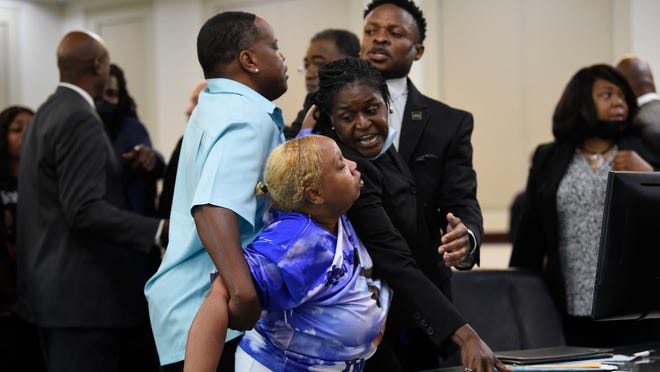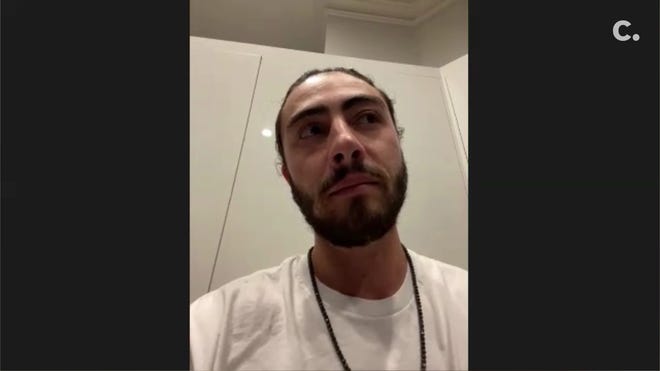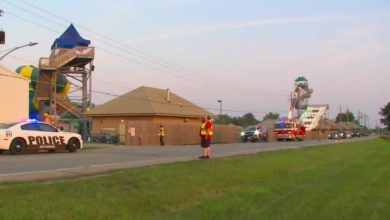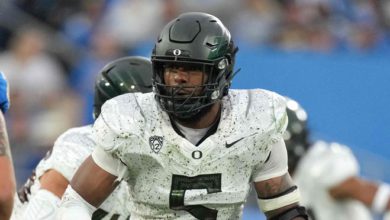

NASHVILLE, Tenn.— The first Nashville police officer ever charged with murder in an on-duty shooting reached an unexpected deal with prosecutors — mere days before he was set to go to trial.
Andrew Delke, who resigned from the force Thursday, will serve three years on a charge of voluntary manslaughter. He pleaded guilty Friday during a tense and emotional hearing that erupted in outbursts from the victim's mother and family.
Delke, 27, who is white, shot Daniel Hambrick, a 25-year-old Black man, three times in the back as he ran away after a traffic stop on July 26, 2018.
Delke was charged with first-degree murder in the shooting. Under the terms of the plea agreement, he is expected to serve three years. Details of any possible early release or probation were not available ahead of the court hearing. Voluntary manslaughter is a class C felony in Tennessee.

Hambrick's mother, Vickie Hambrick, addressed the court and exploded in anger, screaming: "I hate you."
Her emotional outbursts continued for minutes. She tried to knock over the prosecution's table. Delke was removed from the courtroom and Vickie Hambrick was escorted from the room by supporters and other family members. When court resumed, Delke pleaded guilty to voluntary manslaughter.
"The reality is tonight for the first time ever a Nashville officer is going to bed in jail for killing a Black man," District Attorney General Glenn Funk told The Tennessean, part of the USA TODAY Network. "Nashville officers now know they will be held accountable for their actions."
Funk, who said his team was ready for trial, said the case was never a "slam dunk." He added he hopes the conviction and sentence will serve as a catalyst for change.
"Daniel Hambrick's life is worth more than three years. But it’s all of the facts in this case that make this the right disposition. In my best judgement, not only is it appropriate, but in this case, it’s what’s best for Nashville," Funk said.
"Incarceration is primarily a deterrent to future crime. What I’m hoping is that this deters future unjustified killings, and that police training, the initiatives that (Nashville police) Chief (John) Drake is trying to work on with the police department, will achieve success to make us a safer community."
Outside the courthouse Friday, protesters gathered, calling for justice for Hambrick.
"They need to know the decisions they are making are not OK with us," said Jamel Campbell-Hooch, a leader with Gideon’s Army, a local group pushing for police reforms. "Until we get there pressure, pressure, pressure and more pressure… we are not OK with the way they treat Black lives and Black bodies."
Davidson County Sheriff’s Office deputies watched the group as they stood along the perimeter of the courthouse.
Hambrick family urged judge to reject plea deal
Inside, court was called to order just before 9:30 a.m. At the start, Joy Kimbrough, the attorney for the Hambrick family, stood up and asked the judge to reject the plea.
"On behalf of the family, the attorneys for the family and the general public, we're asking you as your citizens, citizens of this community, Judge Monte Watkins, that you reject this plea agreement," Kimbrough said.

The judge started asking Delke questions. It led to an outburst from Hambrick's mother, who was one of several members of the Hambrick family in the courtroom.
"You're a damn liar," Vickie Hambrick said from the gallery when the judge asked Delke if he was on any medications or had any mental health issues.
He was the first Nashville police officer to be charged with premeditated murder for an on-duty shooting, and his ultimate conviction for the death through the plea remains the highest penalty handed down in similar circumstances.
He has maintained he shot in self defense after he saw Hambrick holding a gun.
Delke: 'I am responsible for her loss'
Friday morning, Assistant District Attorney Ronald Dowdy said the "shooting was not reasonably necessary." Delke echoed those words when he addressed the court.
"Mrs. Hambrick lost her son that day and I am responsible for her loss," Delke said. "I am deeply sorry for the harm my actions caused."
In a statement read on Vickie Hambrick's behalf, she said she disagreed with the plea deal.
"My son was murdered on video by Nashville police. My son has a right. He has a right to a public jury trial. I want citizens of this community to render a judgment," Vickie Hambrick said in the statement.
The statement continued: "There is not one hour that goes by that I do not think of Daniel. There is a void in me that cannot be filled. Nothing and no one compares to my precious son. I am angry, mad and disgusted but I pray that no other mother have to endure what I've endured these last three years."
Delke fired his service weapon four times, striking Hambrick twice in the back and once in the back of the head. Investigators found a gun near Hambrick's body, but surveillance footage preserved from the scene does not show Hambrick turning or aiming.
While video footage from surveillance cameras captured most of the foot chase through the apartment complex where the shooting took place, a crucial stretch of grass between houses, approximately 36 feet, was missing from the tape preserved from the scene. It's unclear if it ever existed. The two men crossed the so-called "void area" in seconds.
It's there that Delke told investigators he saw Hambrick turn and point the gun.
Delke's defense attorney, David Raybin, has argued he was following his training to stop what he saw as a threat to the neighborhood.
Metro Nashville Police Department Chief John Drake expressed his condolences for Hambrick's relatives in a statement Friday.
"It is my hope that with today’s court action, we can all continue to move forward, knowing that we cannot undo the events of July 26, 2018," Drake said. "My clear priorities continue to be precision policing, de-escalation and strengthening community partnerships."
Debates over police training and policy
From the beginning, the case has raised debate about whether the criminal court system can bring justice to the victims of police shootings. The landmark murder trial was framed by prosecutors as a chance to hold police accountable to the people and an indictment of policy and training.
Hambrick's death galvanized the long-simmering effort to create a civilian watchdog group to investigate police misconduct. The Community Oversight Board was approved by voters in November 2018.
Hambrick's family sued the city in federal court, saying his death illustrated the "culture of fear, violence, racism and impunity" that exists within the police department. They said officers like Delke were trained from their first days to lean on lethal force and to discriminate against people of color.

The city settled the wrongful death lawsuit earlier this year for $2.25 million.
After all of that, many activists said, the surprising end to the criminal case was underwhelming.
"It feels like they took the easy way out," said Rasheedat Fetuga, founder of the activist group Gideon's Army. "I’m disappointed, and I’m disappointed in myself for feeling disappointed because the system is what it is.”
Sameka Hambrick, Daniel Hambrick's cousin, said the family was devastated by the decision.
Adam Tamburin, Natalie Neysa Alund, Brinley Hineman and Rachel Wegner contributed to this report.
Follow Mariah Timms on Twitter @MariahTimms.
Source link






